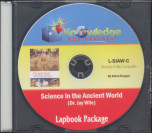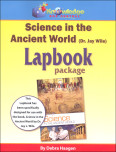We use cookies to make your experience better. To comply with the new e-Privacy directive, we need to ask for your consent to set the cookies. Learn more.
Science in the Ancient World, is divided into six chronological time periods: Science before Christ (570 B.C- 370 B.C.), Science Before Christ (424 B.C. - 120 B.C), Science Soon After Christ (40 A.D. - 200 A.D), Science in the Early Middle Ages (490 A.D.-1368 A.D.), Science in the Late Middle Ages (1320 A.D. - 1519 A.D.) and Science in the Early Renaissance(contributions of Leonardo DaVinci). The great discoveries of early natural philosophy and science are studied through the brilliant minds of Pythagoras, Hippocrates, Plato, Aristotle, Archimedes, Galen, Roger Bacon, and Leonardo DaVinci along with many others. Topically, students will be introduced to human anatomy, medicine, optics, sound, music, magnets, plant growth, the atmosphere, density, water flow, erosion and more.
Printed Student Notebooks for the Older and Oldest Student include the review activities and space for the student to respond. A convenient Lab Kit provides most items used for hands-on activities to better organize your day.













